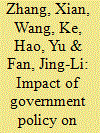|
|
|
Sort Order |
|
|
|
Items / Page
|
|
|
|
|
|
|
| Srl | Item |
| 1 |
ID:
177494


|
|
|
|
|
| Summary/Abstract |
At present, China is undergoing industrial restructuring. However, the resource misallocation problem in China is still serious, which may affect China's green total factor energy efficiency (GTFEE). Based on previous studies, misallocation may be exacerbated by corruption, which would further inhibit GTFEE. In this study, we utilize the provincial panel data of 30 provinces in China from 2005 to 2016 to investigate the relationship between misallocation, corruption and GTFEE by employing appropriate spatial econometric methods and panel threshold model. The results indicate that there is spatial dependence in GTFEE. Local GTFEE is negative impacted by labor misallocation, while it is not affected by labor misallocation in the neighboring area. There is also evidence that capital misallocation in the local area is negatively correlated with GTFEE, although not statistically significant; while the capital misallocation in the neighboring area has significant negative correlation with local GTFEE. The results also indicate that GTFEE is not significant affected by corruption. It is also found that local corruption would aggravate the inhibiting effect of labor resource misallocation on GTFEE, while the inhibiting effect of capital resource misallocation on GTFEE would not be affected by local government corruption.
|
|
|
|
|
|
|
|
|
|
|
|
|
|
|
|
| 2 |
ID:
166312


|
|
|
|
|
| Summary/Abstract |
Energy consumption may play different roles at different stages of urbanization and economic growth. Given China's rapid economic development and urbanization process, this study tries to explore the possible nonlinear relationship between energy consumption and urbanization in China. Against the background of promoting new-type urbanization, the level of China's urbanization is evaluated comprehensively using the entropy method. A newly-developed dynamic threshold panel model is employed to examine the nexus of energy consumption and comprehensive urbanization with full consideration of heterogeneous characteristics. The Panel Data Vector Autoregression, or PVAR, model is also used to estimate the direct effects of various energy consumption patterns on the urbanization. The empirical results indicate that the nexus of energy consumption and urbanization is indeed nonlinear and that energy consumption is conducive to promote China's urbanization at the current stage of development. However, the positive effect decreases when there is an increase in energy consumption intensity and energy consumption scale, whereas the effect increases with the promotion of energy consumption structure.
|
|
|
|
|
|
|
|
|
|
|
|
|
|
|
|
| 3 |
ID:
125525


|
|
|
|
|
| Publication |
2013.
|
| Summary/Abstract |
To reduce gasoline consumption and emissions, the Chinese government has introduced a series of preferential policies to encourage the purchase of new energy vehicles (NEVs). However, enthusiasm for the private purchase of NEVs appears to be very low. This timely paper addresses the need for an empirical study to explore this phenomenon by identifying purchase motivations of potential NEV consumers and examining the impact of government policies introduced to promote NEVs in China. A questionnaire survey was carried out. The acceptance of NEVs is measured in three different logistic models: the willingness of consumers to purchase NEVs, the purchasing time, and the acceptable price. The results showed that financial benefits, performance attributes, environmental awareness and psychological needs are the four most important factors influencing consumers' acceptance of NEVs. Among these, performance attributes rather than financial benefits are the most important indicator. The moderating effect of government policies to relations between purchasing intention, time and price is not strong as respected while the policy implications are clear that the 'public awareness of government policy' functions as a moderator in the process of acceptance. These findings could give some hints to the government to make better NEV industry policy.
|
|
|
|
|
|
|
|
|
|
|
|
|
|
|
|
|
|
|
|
|